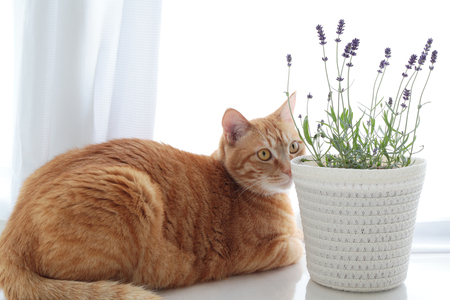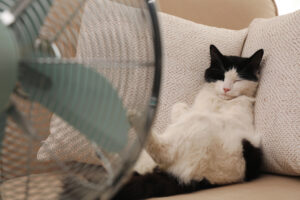What Oils are Safe for Cats?

When it comes to your cat, certain precautions involving an essential oil need to be taken. Unlike dogs, using some products can have serious consequences. While many oils can be used for dogs, for example, there are oils out there that should not be used on your cat.
Why are some oils safe for dogs and not for cats? The answer lies in the way a cat metabolizes the product. When a oil is given either orally or put upon the skin, the liver in the cat is where the product is metabolized. However, in felines, there is a certain enzyme lacking, and this prevents the oil from being properly converted into a harmless substance.
This is why it’s important to be very aware of the concentration of the oil being used. In general, the greater the concentration of the product, the less likely it is that it’s safe for a cat.
Does this mean that every essential oil is dangerous to your cat? Absolutely not. While there are certain oils that are highly toxic to our feline friends, others are safe when used in diluted doses and when properly dispersed.
The oils dangerous to our feline companions include peppermint oil, cinnamon oil, citrus oil, and tea tree oil. These oils have been shown to be “cat toxic” and should be kept well away from any exposure to the pet.
Using Oil Diffusers
Passive diffusers can be used around the pet. Basically, the essential oil is placed in a container and as the oil evaporates into the surrounding air, the product is diffused into the environment. For the most part, using an essential oil in a passive diffuser shouldn’t produce any harmful side effects to the cat. Of course, if the cat is able to come into contact with the oil, this might lead to problems.
The market has recently seen active diffusers being used. Unlike passive diffusers, the active diffusers release a stream of microparticles of the oil into the air itself. This mist is designed to quickly evaporate, but in the event the cat is too close to the diffuser, it can either get onto the cat’s skin or the animal might accidentally inhale the mist. This would have the same effect as if the cat were to have ingested the product.
Because some individuals assume that whatever essential oil they use on themselves would be safe for their pets, it’s important to remember that cat owners should research any essential oil product intended to be used on a cat. Doing basic research should provide information on whether or not the oil itself is harmful, as well as which dilution range would work best.
Signs of Oil Toxicity
There are four common signs to look for if you’re worried about essential oil toxicity in your cat.
First, if you notice your playful cat is now lethargic and seems uninterested in normal activities, consult your veterinarian immediately.
Next, there might be changes in eating and sleeping. If your cat suddenly seems to have lost their appetite, that could be a sign they are definitely not feeling well.
Third, if your cat seems uncoordinated or confused, contact your veterinarian immediately.
Lastly, if your cat seems to have digestive issues – including constipation or vomiting or diarrhea, consult your veterinarian.
Safe Oils to Use for Cats
There are essential oils that are safe for your cat, as well. Experts in holistic care for pets agree that some oils can be used on cats without harmful side effects. For example, lavender essential oil can be used on your feline companion. Anecdotal evidence seems to support the claim that it eases tension and anxiety in both pets and humans. Another essential oil used by cat lovers is frankincense. This oil has properties beneficial to both animals and humans – including working as a disinfectant, being an anti-inflammatory product, and reportedly helps with certain digestive issues (including constipation).
When it comes to flea prevention, many essential oil users believe cedarwood oil is the best product used topically on a cat. Pet care experts have found cedar shavings, for example, help keep fleas and other pests away from our pets.
Of course, an individual cat might also have individual allergies to an essential oil. For example, while many felines might tolerate lavender oil without any adverse reaction, your cat might be genetically predisposed to being unable to tolerate it. Therefore, whenever you’re introducing an essential oil around your cat, it’s advisable to monitor the situation closely at first. If there seems to be the slightest issue with the oil, immediately stop using it and, if needed, take your cat to your veterinarian, along with a sample of the oil.




















